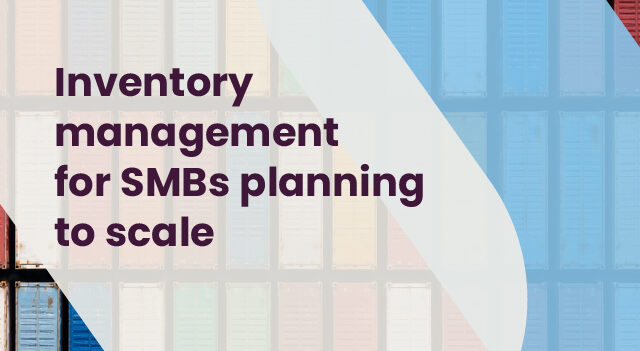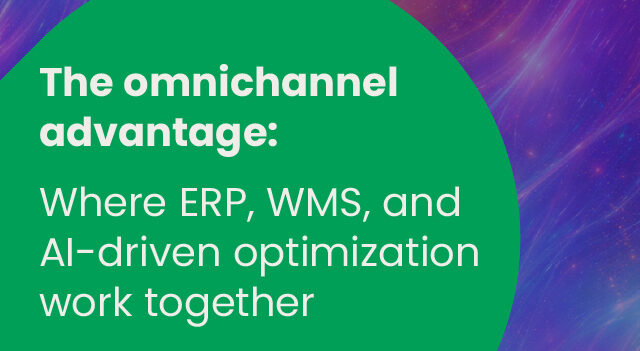For SMBs in the supply chain, cyber risks are rising fast. Learn how to protect your data, operations, and cash flow, even with limited resources.
Data is your most valuable asset, and your greatest vulnerability.
For SMBs in the supply chain facing challenges like rising tariffs, inventory pressures, and labor shortages, cybersecurity often takes a backseat. With limited resources and mounting demands, it’s easy to overlook this critical area. But in today’s digital landscape, even a single breach can halt operations, drain resources, and damage trust.
That’s why it’s essential for SMBs to shift cybersecurity from an afterthought to a cornerstone of business continuity and growth. And you don’t need a massive IT team to get started. Small, consistent actions can go a long way in protecting your data, reputation, and bottom line.
What’s in this blog?
Data is your most valuable commodity – protect it!
Data is the backbone of your business. When compromised, it can grind operations to a halt and erode customer trust. Safeguarding this vital asset should be non-negotiable.
Start with the basics: encrypt sensitive information, back up your data regularly, and conduct routine security audits. These steps help ensure you can bounce back quickly if an incident occurs.
Netstock has built its software with security in mind from day one. Our ISO 27001 certification confirms that our systems follow the highest international standards in protecting your business-critical data.
With 43% of cyberattacks now targeting small and mid-sized businesses, and only 14% prepared to respond, cybersecurity can’t be an afterthought. SMBs need software partners who take security seriously. Netstock’s ISO 27001 certification shows our commitment to protecting your data so that you can grow your business without growing your risk – Rizwana Khan, Manager: Certification, Data Privacy and Internal Audit at Netstock
One breach = major financial and reputational damage
Cyberattacks don’t just affect large corporations. In fact, 43% of cyberattacks target small businesses, and the average cost of a breach exceeds $200,000.
The financial toll is significant, but reputational damage can linger longer. Customers lose trust, and partners hesitate. A single event can create ripple effects that threaten your business’s long-term viability.
A recent example: In June 2025, United Natural Foods Inc. (UNFI), the largest publicly traded food distributor in North America, was forced to take key systems offline after a cyberattack on June 5. The breach disrupted order fulfillment across 53 distribution centers, affecting Whole Foods and other national retailers
Prevention is more affordable and less painful than recovery.
Cybersecurity is a team effort
Cybersecurity isn’t just an IT department concern. From leadership to frontline staff, everyone plays a role in keeping your systems secure.
Train your team to spot phishing attempts, enforce strong passwords, and keep access to systems tightly controlled. Embedding security into daily workflows builds a culture of shared responsibility and makes your business more resilient.
Why supply chain SMBs are prime targets
Supply chain businesses are interconnected, and that’s exactly why they’re at risk. Cybercriminals often see SMBs as the weakest link in their attempts to infiltrate larger ecosystems.
Attackers exploit shared systems and third-party platforms to compromise sensitive data, interrupt operations, or even reroute deliveries.
Investing in cybersecurity isn’t just protecting your own business: you’re protecting everyone down the chain.
Economic pressures are real, but don’t ignore security
Tariffs. Rising inventory costs. Labor shortages. It’s understandable that cybersecurity sometimes slips down the list.
But deprioritizing security is short-sighted. Breaches are expensive. They eat into already-tight margins and divert attention away from recovery and growth. Strategic businesses don’t treat cybersecurity as optional—they see it as foundational.
“Cybersecurity is no longer a cost center. It’s a continuity enabler.”
Choose software built for security: start with certifications
When evaluating new software, make security a key criterion, not an afterthought. Look for platforms with:
- End-to-end encryption
- Multi-factor authentication (MFA)
- Strong access controls
- Transparent data policies
Even more importantly, look for certifications.
Why ISO 27001 matters: This globally recognized certification confirms a vendor’s commitment to managing risk, securing systems, and following stringent, audited protocols. It’s not just a badge—it’s proof your partner takes your data seriously.
Netstock is ISO 27001 certified, with regular audits and continual improvements to keep customer data safe.
What to ask your software vendor:
- Are you ISO 27001 certified?
- How do you manage customer data access?
- Do you use third-party tools for AI or analytics?
- What’s your incident response plan?
For a deeper dive into choosing the right supply and demand planning software, including what questions to ask vendors, check out our guide: 5 Steps to Selecting Demand and Supply Planning Software.
Innovation shouldn’t come at the cost of security
AI can transform your supply chain planning but only if it’s built securely. Too many platforms treat AI as a feature-first tool, leaving data protection as an afterthought.
Not at Netstock. Our AI capabilities were built from the ground up with data security in mind. Your data never leaves the Netstock ecosystem, giving you the power of AI without compromising on privacy.
Netstock’s secure AI includes:
- On-platform data processing
- No third-party data exposure
- Compliance with international privacy standards
You don’t have to choose between innovation and safety.
How to improve your cybersecurity posture (even with limited resources)
You don’t need a team of experts to get started. Here are practical, high-impact steps SMBs can take today:
- Update your software regularly. Outdated systems are open doors for hackers.
- Enable MFA. Adds a second layer of security that blocks most unauthorized access.
- Train your team. Phishing attacks target people, not just systems.
- Backup your data. Make it routine. Store backups securely and off-network.
- Audit your vendors. Ensure your partners maintain strong security practices too.
- Document your security practices. This prepares you for emergencies and demonstrates your commitment to customers and partners.
Make security a strategic pillar, not an afterthought
Cybersecurity doesn’t need to be overwhelming. Start where you are, make steady progress, and choose partners who prioritize your security.
At Netstock, security isn’t just a feature; it’s a foundation. From our ISO 27001 certification to our secure AI tools, we’re committed to helping SMBs stay protected while they grow.
You don’t have to choose between security and innovation. With the right mindset and the right tools, you can have both.




